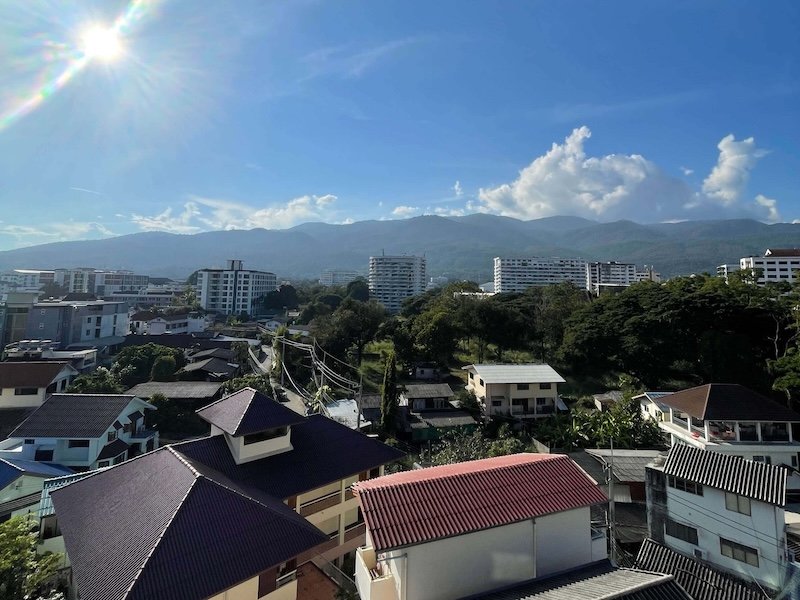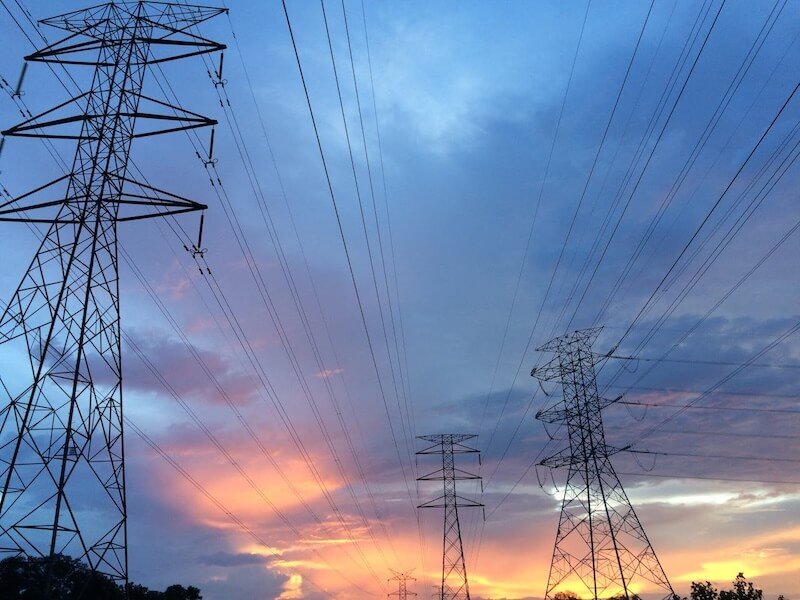Introduction
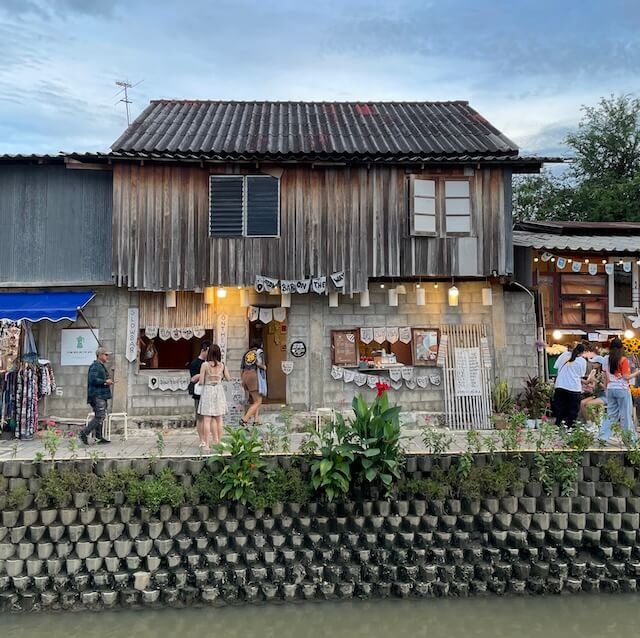
Are you considering a move to Chiang Mai but worried about the cost of living?
Whether you’re a digital nomad setting up your dream remote office, an expat searching for a long term home, or a slow traveler seeking to enjoy every moment in this city, understanding the real cost of living is crucial.
This guide will save you hours of sifting through scattered information.
We’ll provide you with clear, practical insights that will not only help you budget but also help you optimize your lifestyle in this amazing Thai city.
From finding the perfect accommodation to managing daily expenses like food, transportation, healthcare, and leisure, we’ve covered all the essential details.
By the end, you’ll have a solid understanding of what it takes to live comfortably in Chiang Mai in 2025, whether you’re living on a tight budget or indulging in a more luxurious lifestyle.
Get ready to make informed decisions and start your journey to a more affordable, fulfilling life in Chiang Mai.
2025 Living Costs in Chiang Mai: Budget Overview and Breakdown
Chiang Mai has built its reputation as an expat friendly and digital nomad hub thanks to its affordable cost of living and exceptional quality of life.
Whether you’re on a tight budget or seeking more luxurious comforts, the city offers a wide range of lifestyles that cater to different financial needs.
Low Budget
For those living on a low budget, expenses can range from 20,000 – 30,000 THB ($600 – $900 / £460 – £690) per month.
This includes basic accommodations like a modest studio apartment in an older building, local street food, and entertainment such as exploring markets, temples, or natural attractions.
Maintaining a high quality of life on this budget is achievable with careful spending, though indulgences like artisan coffee, Western dining, and frequent nights out will need to be occasional treats rather than regular habits.
Average Budget
If you’re looking for a more balanced lifestyle, you should budget between 35,000 – 60,000 THB ($1,000 – $1,800 / £765 – £1,400) per month.
This level of spending covers a modern apartment in a central neighborhood, dining at both local and Western style restaurants, and leisure activities like visiting gyms, co-working spaces, and occasional weekend getaways.
Many people find that this budget allows for a comfortable and well rounded lifestyle in Chiang Mai, offering the perfect mix of affordability and enjoyment.
If you’re planning a move to Chiang Mai, this is the minimum budget we recommend to ensure a comfortable lifestyle with peace of mind and room for unexpected expenses.
Higher Budget
For those wanting a more luxurious experience, monthly costs start at around 70,000 THB+ ($2,000+ / £1,550+).
This includes renting a high end condo or villa, fine dining, and premium leisure activities like luxury spas, golf, and private transport. Remember, the more indulgences you seek, the higher your budget will need to be.
The great thing about living luxuriously in Chiang Mai is that it’s still highly affordable compared to Western cities. Whether you’re seeking fine dining, upscale accommodations, or regular spa treatments, Chiang Mai offers a wide range of premium experiences at a fraction of the cost.
This city’s unique ability to cater to every lifestyle, be it modest or lavish, means you can enjoy comfort and luxury without breaking the bank.
From affordable, yet high quality living to indulgent luxury, Chiang Mai offers unbeatable value, making it an ideal destination for expats, digital nomads, and slow travelers. No matter your lifestyle preferences, the city ensures that your money stretches further, allowing you to enjoy all that Chiang Mai has to offer while maintaining a high quality of life.
Monthly Accommodation Costs: Renting in Chiang Mai
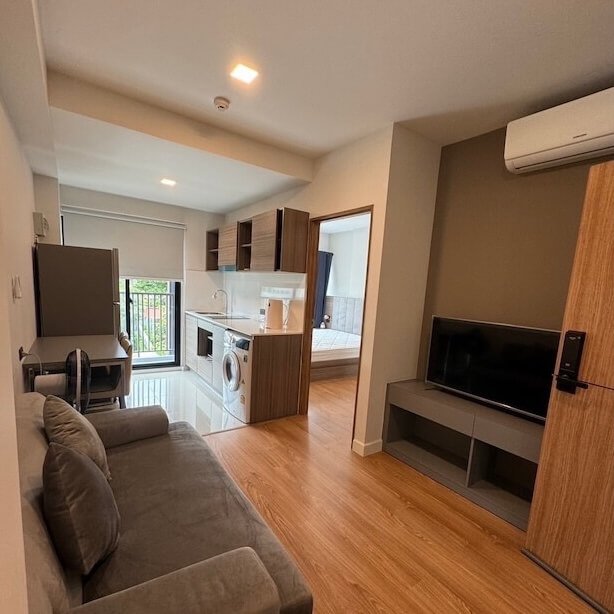
When it comes to accommodation in Chiang Mai, renting is one of the largest expenses you’ll encounter, but the range of options means you can tailor your budget to fit your needs.
Chiang Mai offers everything from basic, no-frills apartments to luxury condos, making it accessible for various types of residents, whether you’re looking to keep costs low or indulge in comfort.
If you’re on a budget, expect to find small studios or guesthouses starting at around 4,000 to 12,000 THB ($120 – $350 / £90 – £265) per month. These properties tend to be located slightly outside of central areas like Nimman and the Old City, but they provide the essentials for a comfortable stay.
Mid range accommodation offers more space, modern amenities, and a central location. One or two bedroom apartments in popular areas such as Nimmanhaemin typically cost between 15,000 and 25,000 THB ($430 to $720 / £330 – £550) per month, ideal for those looking to balance cost with proximity to cafes, coworking spaces, and social spots.
For a more luxurious lifestyle, high end condos and villas range from 30,000+ THB ($850+ / £650+) per month. These options often come with premium facilities like pools, gyms, and private security, catering to those who want a higher standard of living.
To save on rent, consider signing a long term lease or looking for rentals during the off peak tourist season. Landlords are often more open to negotiation if you’re staying for six months or longer, and you could secure a lower price with a longer commitment.
Utilities, Internet, and Phone Costs in Chiang Mai
Utilities, internet, and phone costs in Chiang Mai remain affordable for most residents, but the total will vary based on your usage, particularly for electricity if you rely heavily on air conditioning.
Monthly utility bills, including electricity and water generally range between 1,200 and 4,000 THB ($33 to $115 / £26 to £94). On the higher end of the scale, expect this if you frequently use air conditioning or have larger living spaces.
Being mindful of air conditioning usage can help you maintain a lower bill, especially during the cooler months when it’s not as necessary.
Internet services are widespread, with fiber optic options available throughout the city. You can expect to pay between 400 and 1,200 THB ($11 to $33 / £9 to £27) per month for high speed internet, depending on the provider and the package you choose.
For mobile phone plans, basic packages that include plenty of data typically cost around 400 to 800 THB ($11 to $23 / £9 to £18) per month. Many providers offer competitive rates for mobile plans, and it’s easy to find options with generous data allowances for those who rely heavily on mobile internet.
A useful tip for keeping your utility costs down is to limit your air conditioning usage to the hottest parts of the day and turn it off when you leave the house. Air Conditioning will be the single largest contributor to your overall monthly energy bill.
It’s also important to keep an eye on accommodation electricity rates being charged, as these can significantly impact your overall living expenses in Chiang Mai. The Thai government’s official electricity rate is typically below 5 THB per unit, but accommodation providers may charge a higher rate, at 6 THB or more per unit.
This markup can add up quickly, especially if you frequently use energy intensive appliances like air conditioning. Before signing a rental agreement, ask about the electricity rates charged to ensure you’re not paying inflated prices, particularly if you anticipate high energy usage. Understanding this upfront can save you from unexpected spikes in your monthly utility bills.
To find out every mistake we made when renting in Chiang Mai, check this article.
Chiang Mai Transportation Costs

Getting around Chiang Mai is not only convenient but also easy on the wallet. Whether you’re using public transport, renting a motorbike, or taking advantage of ride sharing apps, transportation costs in the city remain impressively affordable for expats, digital nomads, and travelers.
Public transportation options such as songthaews (red shared taxis) typically cost around 30+ THB ($0.85+ / £0.70+) per ride but this can vary depending on the driver. Unless you can speak Thai, you will likely end up paying higher.
Tuk-tuks, while a popular choice for tourists, can be pricier depending on the distance and your negotiating skills. They are often less cost effective for regular use compared to other options.
For those looking for flexibility, renting a scooter in Chiang Mai is one of the most common ways to navigate the city. Monthly rentals for a basic 125cc scooter usually range from 2,000 to 3,000 THB ($55 – $85 / £45 – £70).
If you’re staying long term, purchasing a second hand motorbike can save money in the long run.
Ride sharing apps like Grab offer a convenient alternative to taxis or tuk-tuks. Prices for short car rides within the city vary between 70 and 200 THB ($2 – $6 / £1.50 – £5), making it an affordable option when you want to avoid bad weather. Book a motorbike taxi with them for even cheaper short distance rides and to beat the traffic.
If you prefer cutting transportation costs entirely, consider living centrally in walkable neighborhoods like the Old City or Nimman, where many shops, cafes, and coworking spaces are within easy walking or cycling distance. Check our Chiang Mai area guide for more detailed information.
Food and Grocery Costs in Chiang Mai
Chiang Mai is a true haven for food lovers, offering everything from budget friendly street food to high end international cuisine.
Whether you’re a fan of Thai dishes or prefer Western meals, the city has options that cater to all tastes and budgets.
Eating Out
Local food is the most affordable way to eat in Chiang Mai. A typical meal at a street food stall or small local Thai restaurant will cost around 50 – 100 THB ($1.50 – $3 / £1.20 – £2.50). These meals are both delicious and easy on the budget, making them ideal for daily dining.
If you prefer Western food or wish to dine at mid range restaurants, prices rise to around 200 – 500 THB ($6 – $15 / £5 – £12) per meal. Chiang Mai has a growing range of international dining options, especially in areas like Nimmanhaemin and the Old City, which are popular among expats and digital nomads.
Cooking at Home
For those who like to cook at home, grocery costs typically range between 7,000 and 10,000 THB ($200 – $280 / £165 – £235) per month. Shopping at local markets, where fresh fruits, vegetables, and Thai ingredients are abundant and affordable, can help you stretch your budget further. However, expect higher prices when shopping at Western style supermarkets for imported goods or specialty items.
To keep your food costs balanced, a good strategy is to enjoy local Thai meals most of the time while reserving Western or upscale dining for special occasions. This approach allows you to enjoy a wide variety of culinary experiences without overspending.
Healthcare and Insurance in Chiang Mai: Affordable and High Quality
Chiang Mai offers high quality healthcare at affordable prices, making it a popular choice for expats seeking both routine and specialized medical services without breaking the bank.
Whether you opt for public hospitals or private care, you’ll find the city’s medical infrastructure reliable and accessible.
Public healthcare is an affordable option for basic treatments or non-urgent care. A doctor’s visit at a public hospital will usually cost between 500 – 2,000 THB ($14 – $55 / £12 – £46), depending on the service you require. Though affordable, wait times in public hospitals can be longer, and the level of English proficiency may vary among medical staff.
For quicker service or more specialized care, private hospitals in Chiang Mai offer excellent medical services at a fraction of the price you’d pay in Western countries. Popular private hospitals, such as Bangkok Hospital Chiang Mai or Chiang Mai Ram Hospital, are equipped with state of the art facilities and cater to international patients. Though pricier than public hospitals, private care is still much more affordable than in Western countries.
To ensure peace of mind, having health insurance/ travel insurance is highly recommended. A good health insurance plan tailored for digital nomads and expats typically costs between 2,000 – 4,000 THB ($55 – $115 / £46 – £95) per month, depending on the coverage and provider.
Planning ahead with adequate insurance is essential to avoid out of pocket costs for emergencies or more extensive procedures. Overall, healthcare in Chiang Mai is high quality and remarkably cost effective, giving expats access to excellent medical care without the hefty premiums found elsewhere.

If you’re looking for affordable and reliable insurance, we highly recommend Genki. It’s the provider we trust personally, and they’ve consistently delivered great service for us. Not only are their plans cost effective compared to other options, but their business is specifically designed for expats and digital nomads.
Check out Genki for genuinely decent insurance coverage if you’re considering the move to Chiang Mai.
We drink a lot of coffee. When you buy something using links on our site, we may earn an affiliate commission to pay for that coffee at no extra cost to you.
Gyms and Fitness Costs in Chiang Mai

Staying fit in Chiang Mai has never been easier, with a wide variety of fitness options, including gyms, CrossFit, yoga, and Pilates classes, to suit all preferences and budgets. We cover the top 10 best gyms in Chiang Mai in this article. For a brief overview however, see below.
Gyms
If you’re looking for a traditional gym with weight training and cardio equipment, you can typically find membership rates between 1,000 – 2,500 THB ($30 – $70 / £25 – £55) per month.
These gyms often provide modern facilities, fitness classes, and personal training options. Some also offer day passes, typically ranging from 100 – 300 THB ($3 – $9 / £2.50 – £7), making it flexible for those who aren’t ready to commit to a full membership.
CrossFit
For those who prefer more intense and structured training, Chiang Mai has several CrossFit gyms, where memberships typically start around 2,000 – 4,000 THB ($60 – $120 / £45 – £95) per month. These gyms offer daily group workouts, strength training, and personalized coaching in a community-driven environment.
Yoga
Chiang Mai has a thriving yoga scene, with numerous studios offering everything from Ashtanga to Vinyasa flow. Monthly yoga memberships range from 1,500 – 2,500 THB ($45 – $70 / £35 – £55), and drop-in classes are available for around 300+ THB ($9+ USD / £7+ GBP) per session. Whether you’re a beginner or advanced, you’ll find classes catering to all levels.
Pilates
For those who prefer Pilates, there are studios across the city offering mat and reformer Pilates. Class packages typically range from 1,500+ THB ($45+ / £35+). Pilates is a great option for building core strength and flexibility, and many studios offer both group and private sessions.
With such a wide variety of fitness options available, it’s easy to stay active in Chiang Mai, no matter your fitness level or preferred type of workout.
Chiang Mai Entertainment Costs: Nightlife, Dining, and More

Chiang Mai offers a dynamic range of entertainment options, catering to different preferences and budgets. Whether you enjoy a casual night out, live music, or a relaxing café experience, the city’s affordability makes it a hotspot for expats, digital nomads, and travelers.
For social outings, here’s what you can expect to budget for various entertainment activities:
Beer
A small local beer at bars or restaurants typically costs between 60 – 120 THB ($1.65 – $3.30 / £1.35 – £2.65). If you prefer to buy from supermarkets, domestic beers are around 54 THB ($1.50 / £1.20). However, imported beers are pricier and range from 150 – 250 THB ($4 – $7 / £3.30 – £5.50).
Cocktails
In trendy areas like Nimmanhaemin, cocktails generally range from 150 – 300 THB ($4 – $8 / £3.30 – £6.60). Upscale venues or bars offering signature drinks may charge higher prices, particularly for crafted or unique cocktails.
Coffee
Chiang Mai’s café culture is legendary, with a standard cup of coffee priced between 50 – 120 THB ($1.40 – $3.30 / £1.10 – £2.65). Artisan cafes or those in more fashionable spots may charge closer to the higher end of this range, making it a social activity that can fit most budgets.
Cinema
Watching a movie at a cinema in Chiang Mai is affordable, with standard tickets costing between 150 – 300 THB ($4 – $8 / £3.30 – £6.60). Prices vary based on the cinema, time of day, or even whether you catch special discounts on weekdays.
Live Music & Events
Chiang Mai’s thriving live music scene is one of the city’s more budget friendly entertainment options. Many bars feature live performances, especially in more popular areas, and do not charge an entry fee.
You can easily enjoy a relaxed evening of music at no extra cost, simply by purchasing a drink or two. For more exclusive cultural events or larger concerts, entry fees can range from free to 200+ THB ($5.50+ / £4.40+), offering affordable entertainment options no matter your budget.
Summary of Entertainment Costs:
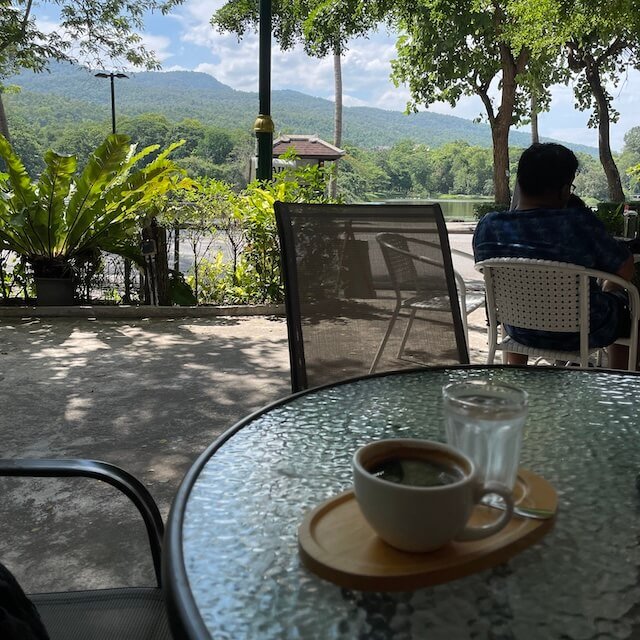
- Beer: 60 – 120 THB ($1.65 – $3.30 / £1.35 – £2.65)
- Cocktail: 150 – 300 THB ($4 – $8 / £3.30 – £6.60)
- Coffee: 50 – 120 THB ($1.40 – $3.30 / £1.10 – £2.65)
- Cinema Ticket: 150 – 300 THB ($4 – $8 / £3.30 – £6.60)
- Live Music: Free – 200+ THB ($5.50+ / £4.40)
Chiang Mai offers a variety of entertainment options that are affordable, yet diverse enough to cater to different tastes and budgets. Whether you’re into lively nightlife, a casual café scene, or something more low key, you’ll find budget-friendly activities that let you enjoy the city to its fullest.
Additional Costs to Consider
When planning your budget for life in Chiang Mai, it’s important to account for miscellaneous expenses beyond just rent and food. These additional costs can add up fast and impact your monthly spending.
Visa Costs
For expats, digital nomads, and slow travelers, renewing visas is a regular part of life in Thailand. Visa costs can vary significantly depending on your visa type, whether it’s a tourist visa, education visa, or the long term Non-B or Retirement Visa. This can be a complex subject with changing regulations and is not a one size fits all answer. The general cost of visa renewals for your visa type should be budgeted into your monthly expenses to avoid any surprises.
As a best practice, it’s wise to set aside between 2,000 to 4,500 THB ($60 – $135 / £45 – £105) per month to cover future visa renewal fees if looking to use tourist or education visas for your stay. This amount will help ensure that you’re prepared for any costs that may arise, such as visa extension fees, visa runs to neighboring countries and next year’s renewal.
We’ll dive deeper into the specifics of visa options and renewal processes in future articles to help you better understand the visa landscape in Thailand. For now, keeping this budget in mind will give you peace of mind as you plan your longer term stay in Chiang Mai.
Laundry and Personal Care
Laundry services in Chiang Mai are affordable, with local laundry shops charging around 500 – 1,000 THB ($15 – $30 USD / £12 – £24 GBP) per month, depending on how often you use them. There are also services which provide laundry priced per kilogram. Perfect for those wishing to drop off their laundry and come back the next day to perfectly folded, clean clothing.
Many apartments also offer coin operated machines, which can further reduce costs. Costs for this are typically 30 – 50 THB ($0.90 – $1.50 / £0.70 – £1.15) per use.
Additionally, personal care items like toiletries and basic cosmetics are reasonably priced, although imported brands may come at a premium. For example, a small bottle of shampoo could cost 50 – 100 THB ($1.50 – $3.00 USD / £1.15 – £2.30 GBP), but luxury or foreign products will be priced higher.
Unexpected Costs
It’s also wise to budget for occasional or unexpected expenses, such as ad-hoc purchases, social events, or even transportation for day trips around Northern Thailand. Factoring in a small buffer for these unplanned costs will help ensure that you aren’t caught off guard financially while living in Chiang Mai.
Incorporating these miscellaneous expenses into your monthly budget will give you a more realistic view of your living costs, helping you to plan and save with confidence.
Money Saving Tips for Expats and Nomads
While living in Chiang Mai is already budget friendly, there are several smart strategies to make your money go even further without sacrificing quality of life:
1. Rent Smart: Opt for long term rental contracts to negotiate better rates, or look for affordable yet well connected neighborhoods like Santitham or Chang Moi. These areas offer cheaper rents than trendy spots like Nimmanhaemin, while still providing access to essential amenities, street food, and local markets.
Signing leases for six months or longer can also help you avoid high short term rental costs. A one year lease is most common to find and offers the best chance of negotiation however.
2. Shop Local Markets: One of the easiest ways to save is by buying groceries from local markets rather than Western style supermarkets.
Fresh produce, meats, and spices are significantly cheaper at markets like Warorot and Muang Mai. You can often buy fruits and vegetables at a fraction of the cost compared to chain supermarkets, and the quality is fresher. This is a great way to stretch your food budget while experiencing the local culture.
3. Cut Down on Transport Costs: If you live in or near the city center, consider walking or cycling to reduce transportation costs entirely.
Chiang Mai is small and easy to navigate, especially if you’re based in areas like the Old City, Nimman, or Chang Moi. You’ll save on taxis, Grab rides, or motorbike rentals, and walking or cycling keeps you active at the same time.
4. Eat Local: Chiang Mai’s street food scene is world famous and incredibly affordable. Instead of dining at Western style restaurants frequently, enjoy delicious local meals for just 50 to 100 THB ($1.50 – $3 / £1.10 – £2.65).
The variety of Thai street food ensures that you won’t get bored while saving big on dining costs. Western dining can add up quickly, so reserving those meals for occasional treats can help keep your budget in check.
5. Utility Usage: To save on utilities, especially electricity, avoid running air conditioning all day. Use fans when possible or invest in energy efficient appliances. Many condo rentals charge inflated rates for electricity, so always check before signing a lease agreement.
With some careful budgeting and lifestyle tweaks, living in Chiang Mai can be even more cost effective, allowing you to enjoy the city’s many perks without overspending. By choosing where and how you spend strategically, you’ll have more financial flexibility to experience all that Chiang Mai has to offer.
Final Thoughts: Is Chiang Mai Still Worth It in 2025?
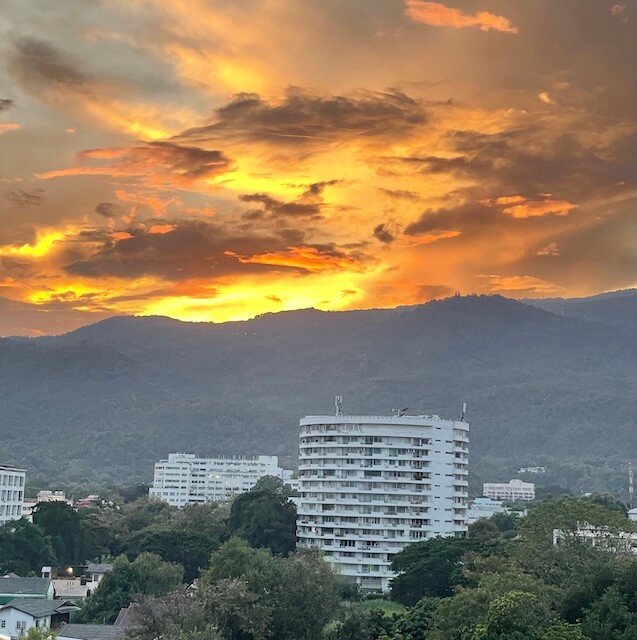
Absolutely! Chiang Mai remains one of the top destinations for expats, digital nomads, and slow travelers in 2025. With its unbeatable balance of affordability, rich culture, and modern conveniences, the city offers an exceptional quality of life at a fraction of the cost of many Western cities.
Whether you’re living on a budget or have the means to enjoy a more luxurious lifestyle, Chiang Mai has something for everyone. From affordable rentals and cheap yet delicious street food to high quality healthcare and a wealth of leisure activities, it’s a city that allows you to stretch your money while living well.
The diversity of neighborhoods, from the vibrant energy of Nimmanhaemin to the peaceful, nature centric suburbs like Pong Noi, means that no matter your preference there’s a spot for you.
Chiang Mai’s value as a destination goes beyond just the cost of living; the city boasts a strong sense of community, a rich cultural heritage, and access to both natural beauty and urban comforts. It’s the perfect mix for anyone looking for an enriching lifestyle in Southeast Asia.
If you’re ready to explore what Chiang Mai has to offer, we invite you to dive deeper into our other guides for more practical advice on how to start your new life in Chiang Mai.
FAQ: Living Costs in Chiang Mai 2025
1. Is Chiang Mai still affordable in 2025 for expats and digital nomads?
Yes, Chiang Mai remains one of the most affordable cities in Southeast Asia for expats and digital nomads. Monthly living expenses can range from as little as THB 20,000 – 60,000 (USD 600 – 1,800 / GBP 460 – 1,400), depending on your lifestyle. Basic costs like rent, food, and transportation are much lower compared to Western countries, allowing for a high quality of life on a modest budget.
2. How much does it cost to rent an apartment in Chiang Mai?
Apartment rental prices vary based on location and amenities. Budget accommodations (modest studios) start around THB 4,000 – 12,000 (USD 120 – 350 / GBP 90 – 265) per month, while mid-range apartments in popular areas like Nimman typically cost THB 15,000 – 25,000 (USD 430 – 720 / GBP 330 – 550). For luxury condos, expect to pay THB 30,000+ (USD 850+ / GBP 650+) per month.
3. What are the average monthly utility costs in Chiang Mai?
Utilities, including electricity, water, and internet, generally cost between THB 1,200 – 4,000 (USD 33 – 115 / GBP 26 – 94) per month. Air conditioning usage is the largest factor in higher utility bills, so reducing AC use during cooler months can help keep costs lower.
4. How much should I budget for food in Chiang Mai?
For those eating primarily at local markets and street food stalls, monthly food costs range from THB 7,000 – 10,000 (USD 200 – 280 / GBP 165 – 235). Dining at Western restaurants or buying imported groceries can increase monthly food expenses significantly.
5. What are the transportation options and costs in Chiang Mai?
Chiang Mai offers affordable public transportation options like songthaews (shared taxis), which cost around THB 30+ (USD 0.85+ / GBP 0.70+) per ride. Renting a scooter is a popular choice for expats, with monthly rental rates between THB 2,000 – 3,000 (USD 55 – 85 / GBP 45 – 70). Ride-sharing services like Grab offer affordable car rides for THB 70 – 200 (USD 2 – 6 / GBP 1.50 – 5).
6. How much does healthcare cost in Chiang Mai?
Chiang Mai has both public and private healthcare options. A doctor’s visit at a public hospital costs between THB 500 – 2,000 (USD 14 – 55 / GBP 12 – 46). Health insurance typically costs between THB 2,000 – 4,000 (USD 55 – 115 / GBP 46 – 95) per month, depending on the coverage and provider.
7. Is Chiang Mai a good place for slow travelers?
Yes, Chiang Mai is ideal for slow travelers who want to spend extended time in a vibrant city with low costs, a rich cultural heritage, and a strong expat community. The relaxed pace, variety of accommodation options, and affordable living expenses make it an attractive destination for slow travel.
8. Can I live comfortably on USD 1,000 a month in Chiang Mai?
Yes, it is possible to live on USD 1,000 (THB 35,000 / GBP 765) per month in Chiang Mai if you choose modest and affordable accommodation and primarily eat low priced local food. This budget would cover essential living expenses like rent, utilities, food, and basic transportation.
9. How much do digital nomads spend monthly in Chiang Mai?
Digital nomads on a budget typically spend between USD 1,500 – 2,000 (THB 52,000 – 70,000 / GBP 1,150 – 1,550) per month. This budget includes rent for a mid range apartment, co-working space memberships, Gym membership, utilities, a balanced mix of local and Western dining, transportation, and occasional leisure activities. Chiang Mai remains an affordable and convenient hub for remote workers, offering a good quality of life at a lower cost than most Western cities.
10. Is Chiang Mai a good place for retirees?
Yes, Chiang Mai is an excellent destination for retirees due to its affordable healthcare, peaceful neighborhoods, and low cost of living. Areas like Pong Noi and Suthep offer quieter environments with easy access to nature, making them ideal for retirees seeking a relaxed lifestyle.
